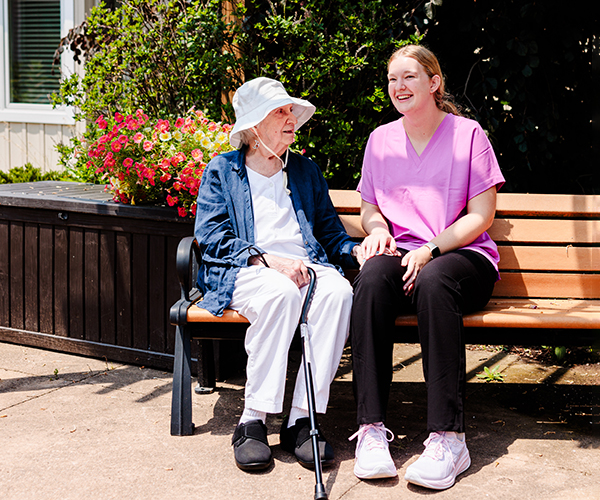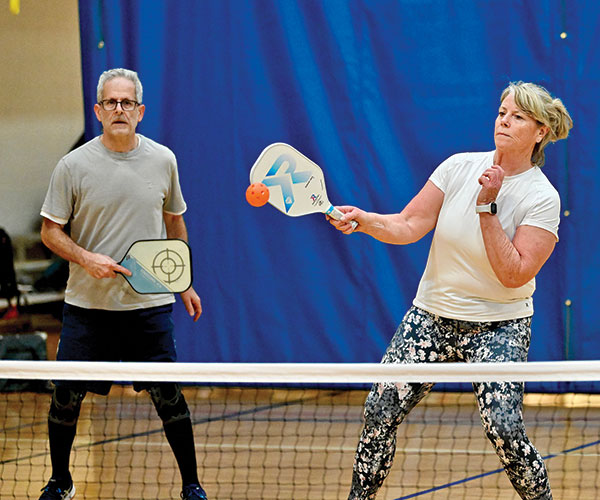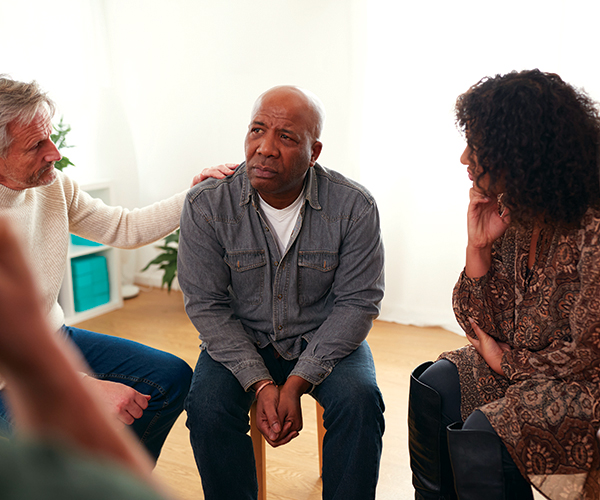Chemotherapy doesn’t usually offer a patient much to look forward to. But Nancy Hull makes sure to schedule her treatments at the Cleveland Clinic for Wednesday afternoons, so she can partake of the weekly high tea held in the bistro on the first floor of the Taussig Cancer Center.
On a recent Wednesday, as a pianist tickled the ivories of the lobby’s grand piano and the scent of apple cinnamon tea wafted through the bistro, Hull relaxed in the sunlight from the floor-to-ceiling windows along Carnegie Avenue.
On a recent Wednesday, as a pianist tickled the ivories of the lobby’s grand piano and the scent of apple cinnamon tea wafted through the bistro, Hull relaxed in the sunlight from the floor-to-ceiling windows along Carnegie Avenue.
“It’s quiet,” sighs Hull, 66, of Cleveland, before picking up her cream puff. “It also provides a nice break from the sterile hospital scene.”
Hull enjoys selecting her favorite from the more than 150 fine china cups and saucers kept in two tall cabinets. Donated by Clinic employees, each set displays the name of the giver’s loved one who was a victim of cancer. The Clinic has treated nearly 2,000 cancer patients, their families and friends and Clinic staff to tea since February.
Most of the 120 tea tipplers on a recent afternoon were elderly. While the event is not on the same scale as the Boston Tea Party, it is symbolic of a gradually unfolding revolution in health care.
Cancer patients 65 and older used to be treated the same as anyone else, even though they have a different physiology and different medical demands. But as people live longer, the medical profession is confronting the fact that it has much more to learn about how to treat elderly cancer patients. Nearly 60 percent of newly diagnosed malignant tumors are found in people age 65 and older, according to the National Cancer Institute, and these older patients account for 70 percent of all cancer deaths.
“There is a growing population who could potentially have cancer and may be amenable to treatment,” says Dr. Elizabeth O’Toole, director of MetroHealth Medical Center’s division of geriatrics and palliative care. “But we’re not sure how best to treat them, because of the changes that occur in their physiology and psychosocial issues, which make the decision-making process more difficult.”
Now, the emerging field of geriatric oncology is incorporating elderly special needs into treatment. Geriatric oncologists are also conducting more clinical trials on elderly cancer patients, pursuing more aggressive and more carefully tailored cancer treatments for them, and addressing the barriers that have kept many older cancer patients from getting good care.
In July, University Hospitals Case Medical Center opened its new geriatric oncology clinic in the Ireland Cancer Center. UH was one of eight cancer research centers to receive grants from a five-year, $25 million initiative of the National Cancer Institute and National Institute of Aging.
The program helps elderly patients with needs ranging from physical therapy to help with prescription management to psychological and social challenges. Two geriatric oncologists team up with a social worker and a nurse practitioner trained in both geriatrics and oncology and physical and occupational therapists. Pharmacy services are included because many older patients suffer from over-prescribed, under-managed drug therapies.
“We’ll be able to identify problems that are peculiar to older patients and intervene in those problems,” says Dr. Cynthia Owusu, director of UH’s new geriatric oncology center. “In the long term, we expect that will translate into fewer recurrences of cancer and prolonged survival.”
Geriatric oncologists are also looking for ways to aggressively treat cancer patients in their 80s and 90s. For many years, doctors advised cancer patients at that age against the rigors of painful and sometimes debilitating treatments. The doctors figured those patients probably didn’t have much longer to live anyway, so why make them suffer?
“Twenty or 30 years ago, people would say, ‘Well, he’s 90. What are you going to do with cancer?’ ” says Dr. Derek Raghavan, director of the Taussig Cancer Center at the Cleveland Clinic and chair of the Clinic’s cancer division. “But now we’re looking at 90-year-olds who quite reasonably might expect to live to 100.”
An 85-year-old woman with a breast cancer lump that hasn’t spread could potentially have been written off in the past, Raghavan says. “If you don’t manage it correctly, that breast cancer could spread and kill her in two years,” he explains. “If you do manage it correctly, you have the potential for her to be alive 10 to 15 years without recurrence.”
To help doctors treat elderly patients, geriatric oncologists are working to enroll more elderly patients in clinical trials. “People are starting to realize that older patients are different and should be treated differently,” says Owusu. “So, we need to design trials to address that.”
Elderly patients are often deemed too frail to handle the side effects of many cancer drugs, so they’re excluded from intense chemotherapy treatments and clinical trials of new drugs, Owusu says. Only 9 percent of patients in clinical trials completed over the past several years were 65 or older, she says. That means sufficient data doesn’t yet exist for elderly patients, so their physicians must extrapolate from data on younger patients when they decide on chemotherapy or radiation treatments for elderly patients.
“When you design clinical trials that way, you cannot conclude that the treatments are applicable to all patients,” Owusu says. “So, we may be giving these elderly patients substandard therapy.” Some oncologists even conclude that since a clinical trial didn’t include any 70-year-old patients, the drug may not be safe for the elderly, she adds.
UH’s geriatric oncology clinic currently has three studies under way involving patients age 65 and older. One is a clinical trial for a new biological agent with minimal side effects for patients with breast cancer. Another study will evaluate the effectiveness and benefits of the geriatric oncology program itself, to determine whether its interventions better enable patients to complete their treatments in a cost-effective way with fewer complications than treatments by oncologists only.
The Cleveland Clinic is studying chemotherapy treatments, which sometimes suppress elderly immune systems. It’s looking for drugs that are not too toxic for the elderly but still effective. Raghavan recently managed a multicenter study of single-agent chemotherapy for breast, bladder and colon cancer patients. It incorporated detailed histories of the elderly patients, including their other medical conditions, from depression to dementia, and what kind of social support they have. The study also tested how well they could clear the drug from their blood system.
“It is a very important study at a national level,” Raghavan says, “because it will allow us to tailor chemotherapy schedules specifically for an older age population.”
Over the past five years, research has demonstrated that elderly patients can tolerate the same treatment regimens administered to younger patients, as long as physicians carefully evaluate the patient’s entire physical health, according to the National Cancer Institute.
“If their chronological age is not commensurate with their physical age — so they are a ‘young’ 80-year-old, say — you may well do things that are quite different,” Raghavan says.
The studies revealed that while some elderly patients experience no problems with cancer treatment, others suffer severely from the side effects. The studies concluded that patients are less likely to tolerate treatments if they suffer from other medical conditions typically found in the elderly, from heart or lung disease and diabetes to poor nutrition to depression and dementia. However, doctors can adjust their treatments to take patients’ other conditions into account.
Doctors are also tackling some of the simplest reasons that the elderly often do not get effective cancer treatment. Raghavan identified three in a paper published last year. First, older generations’ cultural perspective can lead them to view cancer as an embarrassment to their families, rather than a medical disorder that needs assessment and treatment. “For people who were born around World War II or earlier, the whole thought of having cancer was seen as a socially unacceptable condition,” Raghavan says. “You just didn’t talk about it.”
A second factor is “medical protectionism,” when doctors are overly protective of elderly patients. Some doctors who are not experts in cancer care for the elderly believe subjecting them to the rigors of chemotherapy, radiation or clinical trials will result in unnecessary suffering or experimentation. Doctors may keep patients from receiving care that will ultimately help them.
Raghavan’s third factor was the all-too-typical situation of older people not possessing the resources to access proper medical care. For instance, they may live alone and have no means of transport.
Despite recent improved and enlightened approaches to cancer care for the elderly in some quarters, Raghavan believes a tremendous effort is still required to educate primary care physicians and oncologists about the geriatric oncology revolution. “The elderly need to be looked at as a multitiered system,” he says. “Just looking at age isn’t the way to go.”
Owusu, who joined the first class of geriatric oncology fellows at Boston University’s medical school in 2002, is focused on developing an abbreviated geriatric assessment that can be administered in the short time most physicians have with their patients during regular office visits. She says she would like to see every oncologist receive training in how to administer geriatric assessment tools. She is also optimistic that geriatric oncology training programs will continue to emerge at major medical centers throughout the U.S. to meet the growing need as the baby boomer generation ages.
“We in medicine realized that we had better start planning now and training people to cope with this issue,” Owusu concludes. “Because it’s going to be a huge problem a few years down the road.”



